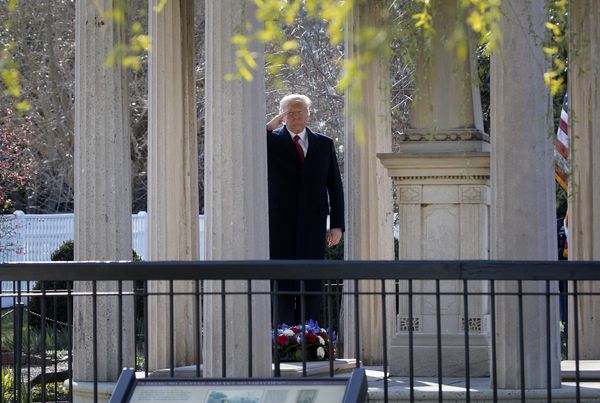At the “Days of ’47” rodeo in Salt Lake City late last month, an event that commemorates the arrival of the first Mormon settlers in Utah, Interior Secretary Ryan Zinke declared that “Utah understands that religious freedom is the cornerstone of American exceptionalism.”
It’s a concept–American Exceptionalism–that is expressed frequently in American political discourse by those on the right. America is unique, the argument goes, in its commitment to liberty and individual freedom, including religion, principles upon which the nation was founded and its first European settlers embraced. Some, echoing the  rhetoric of nineteenth-century “Manifest Destiny,” take things a step farther and argue that God ordained America’s special role in world history. As President Trump asserted in his prepared remarks, read to the audience in Utah by Secretary Zinke, “our nation honors the ingenuity, industry, and unwavering commitment to faith of all those who endured frontier hardships.” Oh, these pioneers, Trump’s statement continued, how they “worked tirelessly to transform this arid desert landscape into a blossoming new home where their families could live in peace and prosperity.”
rhetoric of nineteenth-century “Manifest Destiny,” take things a step farther and argue that God ordained America’s special role in world history. As President Trump asserted in his prepared remarks, read to the audience in Utah by Secretary Zinke, “our nation honors the ingenuity, industry, and unwavering commitment to faith of all those who endured frontier hardships.” Oh, these pioneers, Trump’s statement continued, how they “worked tirelessly to transform this arid desert landscape into a blossoming new home where their families could live in peace and prosperity.”
Yet if many conservatives embrace American exceptionalism, American historians do not. When we say that a book seems steeped in American exceptionalism, we are criticizing it for an uncritical approach to the past that fails to examine whether the events that an author discusses occurred elsewhere. Looking at America in isolation from the rest of the world can lead to problems. Although the American patriots declared their independence from Great Britain in part because they believed that all men were created equal, to cite just one example, it was their imperial overlords that first abolished the horrible institution of racial slavery, and they did so without a war that killed more than 600,000 people. The liberty achieved through the Revolution was distinctly limited, and other nations, in other places, seemingly embraced liberty more fully and more thoroughly than did the United States.
We historians also reject the celebratory implications of so much American exceptionalism, so evident in President Trump’s statement, because it overlooks the costs, the violence, and the cruelty that accompanied the “settlement” of this continent. Once, when I appeared on a local radio show discussing the Declaration of Independence, one of the other guests said that America was settled by people who sought freedom. I wish I had pointed out that when one looks at English America between 1630 and 1780, the number of people who arrived in the colonies was three times more black than white. Most of those who came to Anglo-America, then, came not in search of freedom but in chains. And that “arid desert” that the persecuted Mormon settlers transformed, and the wilderness through which they passed to get there, was somebody’s homeland prior to their arrival. From New England to California, white settlers’ gains came at the expense of native peoples who lost their land, African slaves who lost their freedom, and a host of other peoples from Europe and around the globe who found themselves on the outside looking in.
Historians have an obligation to bring up these inconvenient truths. We can celebrate all this country offers without forgetting the cruelty, exploitation, and violence that accompanied its founding. And that cruelty continues. Just a few days after Zinke’s appearance in Salt Lake City, the Pope proclaimed at long last that capital punishment was incompatible with Catholic teaching. Capital punishment, however, still has many adherents in this country, the President himself among them. News sources reported on devastating declines in a number of species of animals, including King Penguins and Lemurs (which “wanton destruction of the planet’s ecosystem and the subsequent suffering of so many other species,” Andrew Sullivan wrote recently in an otherwise deeply problematic essay, “may be the cruelest act of humankind in our time”). Meanwhile, the Trump administration fails completely to undo the premeditated damage caused by its “zero-tolerance” policy of family separation, including heart-broken parents and traumatized children. Trump administration officials were warned that this policy could do enormous damage to innocent children and they went a head and did it anyways, a program of deliberate cruelty. It has always been there. It is a thread that runs through all of American history. There is courage and bravery and selflessness. There are so many acts of heroism. But always there is as well the cruelty, the exploitation, the violence. We cannot ignore that part of the story.
This past week I drove with my family from Montreal back to Rochester. We took the Cornwall Bridge. It crosses the territory of the Akwesasne Mohawks, who have lived on both sides of the St. Lawrence and on Cornwall Island in the river since before the United States existed as an independent nation. At the customs inspectors’ booths, the flashing red and green signs said “Open” and “Closed” in both English and French. This is not surprising. I have crossed this bridge many times, and this is entirely familiar to travelers. But the  signs now include those words in the Mohawk language as well. We might view this as an example of enlightened policy, and act of courtesy by a United States government that has, like Canada, long obstructed the movement of Akwesasne Mohawks across what is, after all, their own land. Such a view overlooks the Mohawks’ struggles to assert their nationhood, their efforts to defend their right to move across their lands, damn the international borders, and even shut down the bridge when their frustrations reached the boiling point. Much of America’s freedom is like that. It was not handed out generously, and it did not rain down upon all equally from the heavens. No, most of the time freedom and liberty have had to be demanded and fought for and taken.
signs now include those words in the Mohawk language as well. We might view this as an example of enlightened policy, and act of courtesy by a United States government that has, like Canada, long obstructed the movement of Akwesasne Mohawks across what is, after all, their own land. Such a view overlooks the Mohawks’ struggles to assert their nationhood, their efforts to defend their right to move across their lands, damn the international borders, and even shut down the bridge when their frustrations reached the boiling point. Much of America’s freedom is like that. It was not handed out generously, and it did not rain down upon all equally from the heavens. No, most of the time freedom and liberty have had to be demanded and fought for and taken.
During the Texas social studies debate of 2009 and 2010, one of the advocates for the state’s proposed curriculum argued that a bad day in the United States is better than a good day anywhere else. The curriculum, which celebrated American exceptionalism, was intended to convey that to Texas schoolchildren. It was a statement of monumental ignorance and stupidity. But it is a sentiment with which so many supporters of our current president would agree.
When we historians point out why these statements are wrong, we try to use specific examples to support our reasoning. It’s not that we lack patriotism, or that we who teach in colleges are “Socialists” or “Snowflakes,” but, rather, that we believe that American exceptionalism erases or diminishes the historical experiences of millions of people who lived on this continent prior to the arrival of Europeans, or the millions who came in chains as slaves, or who faced persecution, prosecution, and discrimination once they arrived.
The cruelty we see today, fueled by a government run by men and women who have shattered long-established notions of decency and civility, and the cruelty we see in the past that Secretary Zinke and the President overlooked, finds its origins and its strength in inequality: between master and slave, for instance, or frontier settlers and militiamen and Indian villagers, or an armed agent of the state and a child, whether an Indian child carried away from his family and community to boarding school or foster care or an exhausted and frightened child seeking asylum.
Frontier days, and these days. The First Amendment to the Constitution provides guarantees for religious freedom, but that right has proved elusive for many throughout American history: Dissenting Christian groups in the colonial period, Jews throughout much of American history, Catholics at times, and Muslims today. Zinke and many other conservatives have argued that America was founded as a “Christian Nation,” an argument that no historian who has studied the issue closely accepts (and, if you are interested, read Tisa Wenger’s recent book). Sure, some groups in American history have made enormous gains. They struggled. They worked hard. But their successes came quite often at the expense of others who were denigrated, derided, and discriminated against. To deny that is to lie to ourselves in the worst possible way about the cruelty and violence that lay at the core of America’s story. We have a lot of dirty laundry. We can hide it or we can air it out. The latter is the better option.


Michael: This is one of the most eloquent, thoughtful, and accessible pieces on American exceptionalism I have ever read. I hope you can publish it as an op ed, if not in the Democrat & Chronicle, then in the WashingtonPost or NY Times. I am proud and thankful to be your colleague and friend. –Chris Dahl
Thanks, Chris. A compliment from you is worth so much to me. I am so glad you found this of value. I hope you are well.